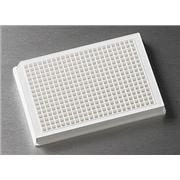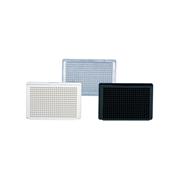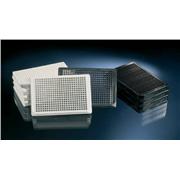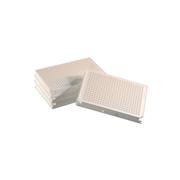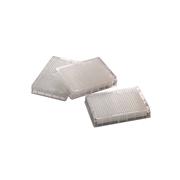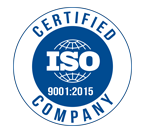384 Well Plates & PCR Plates
The range available includes 384 well microplates designed for robustness and high performance. Their architecture allows for miniaturization of assays, reducing reagent use while maintaining accuracy. The 384 well-clear bottom microplates take this further, enabling precise optical measurements crucial for cell-based assays and fluorescence detection.
For applications requiring greater sample volume or storage capacity, the 384 deep well plates are the solution. These plates are ideal for sample storage and culture growth and are compatible with various liquid handling systems, demonstrating versatility.
Each product, from 384 well PCR plates to deep well plates, is manufactured to address the specific needs of high-throughput methodologies. These plates offer excellent reliability and efficiency and can ensure smooth workflows throughout laboratory applications.
-
 Microtiter Plates
Thermo Scientific
Microtiter Plates
Thermo ScientificWell shapes, colors and binding surfaces for a variety of applications Compatible with all standard instrumentation Rigorous quality control for superior consistency Three Immulon® binding surfaces available Microtiter plates are specifically designed for the demanding immunology…
-
Meets 384 well microplate standards for automation Low water absorption of polymer prevents loss of protein drop volume The CrystalEX 384-well is the only microplate designed for full automation in crystal screening, built to meet industry standards for 384 well microplate footprint and…
-
White wall plates are designed to reduce well-to-well crosstalk during luminescent assays Recommended working volume of up to 20 to 80uL Enhanced flatness provides low intra- and inter- plate CV’s Nonbinding (NBS) surface is a Corning proprietary treatment technology used on…
-
384 Well Plates
Thermo Scientific NuncFour times more wells in the same footprint as 96 well plates MaxiSorp™ surface Available in white, clear or black Total volume per well: 120 µL 384 well plates allow miniaturization of assays and are compatible with robotics, automated readers and liquid handling systems. Plates are…
-
Sterile or non-sterile versions Solvent-resistant Untreated surface Microplate is resistant to many common organic solvents (e.g., DMSO, ethanol, methanol). Plates offer total well volumes of 180 or 240 µL. Certified DNase- and RNase-free, they are available in sterile and…
-
 Polypropylene 384 Well Plates
Thermo Scientific Nunc
Polypropylene 384 Well Plates
Thermo Scientific Nunc4 times more wells than a 96 well plate for assay miniaturization and cost savings Same footprint as 96 well plate, compatible with robotics and automated equipment Rounded square design and round bottom minimizes wicking Efficient washing and maximum recovery of contents …
-
384 Shallow Well Multiwell Plates
Thermo Scientific NuncAutomation compatible Round well bottom Small volume applications 384 shallow well polypropylene plates feature ANSI standard plate dimensions for automation compatibility and a plate height of 14.35 mm for optimal robotic gripping and barcode placement. Maximum working volume is 58…
-
Black with clear flat bottom Working volume 5-40 µL Round well design reduces wicking Non-binding (NBS) surface is a Corning proprietary treatment technology used on polystyrene microplates to create a non-ionic hydrophilic surface (polyethylene oxide-like) that minimizes molecular…
-
384-Well Optical Bottom Plates
Thermo Scientific NuncBlack upper structure with optically clear bottom Rounded square wells eliminate wicking Optimized for scintillation counting Optical film made of polystyrene 384-well optical bottom plates can be read from the bottom and top. Optimized for scintillation counting, the plate features rounded…
-
Low Cross Talk 384 Well Plate
Thermo Scientific NuncNon-treated surface White color Non-sterile 384 well plates feature low cross talk and minimal binding. Plates have a highly reflective surface, low autophosphorescence, and minimum capillary action. Plates are suitable for luminescence applications including scintillation proximity…
-
Round or flat bottoms Sterile or non-sterile versions Polypropylene Model 6928F08 is a clear, round bottom, untreated microplate. It is sterile and certified DNase- and RNase-free. It is resistant to many common organic solvents (e.g., DMSO, ethanol, methanol) and has a total well volume of 95…
-
Cliniplates 384-Well Microplates
Thermo ScientificNon-sterile plates without lids Faster reaction kinetics Compatible with automated and manual systems Rounded well improves mixing Less reagent use; less waste The Cliniplate 384 offers higher sample density, faster kinetics, less waste and lower reagent costs. Suitable for…
-
Dimensional stability Automation compatible Polypropylene construction 384 well PCR microplates feature a rigid construction that is ideal for automation. Uniform wall thinness assures efficient heat transfer while minimizing well-to-well variability. Microplates are 100% tested for well…
-
384 Deepwell Plates
Thermo Scientific NuncDesigned to maximize sample recovery Automation and robotics compatible Non-treated and non-sterile DeepWell plates with diamon-shaped conical bottoms are designed to maximize sample recovery. Plates are compatible with robotics and automation and are suitable for growth of bacteria…
-
384 Shallow Well Standard Height Plates
Thermo Scientific NuncPolystyrene construction Standard height for optimal handling 25 µl total volume saves reagents Non-sterile Non-treated surface 384 shallow well plates feature conical flat bottoms for cell culture or assays. Working range is 2-20 µl/well and the 25 µl total volume saves reagents. Plate…
-
384 Well Plates For Cell Culture
Thermo Scientific NuncSame footprint as 96 well plates with 4 times as many wells Available in white, clear or black plates Sterilized polystyrene Compatible with robotics Lids included These plates allow the miniaturization of assays. Cell culture surface is negatively charged and ideal for…






